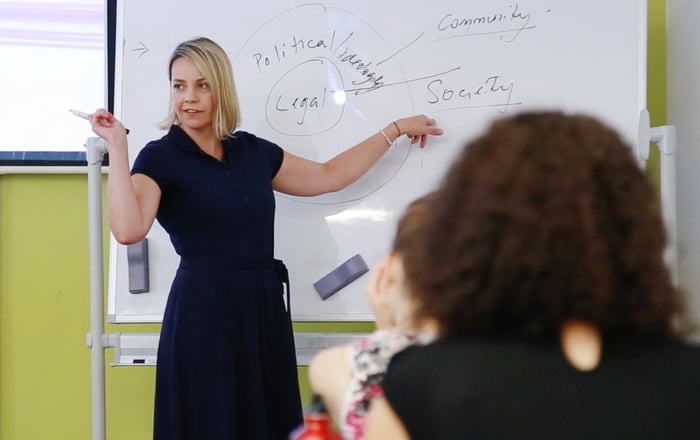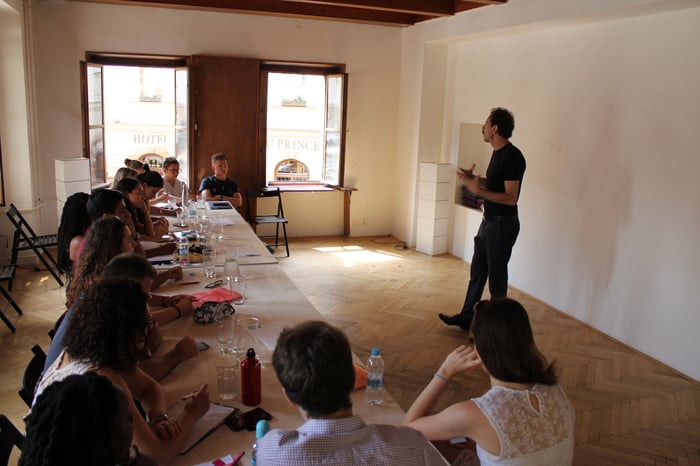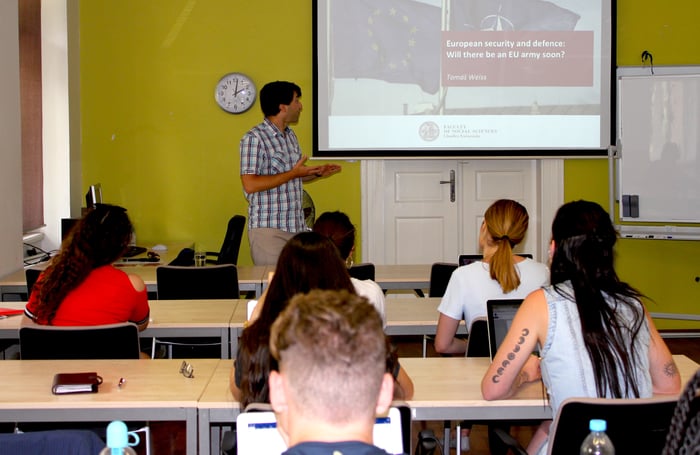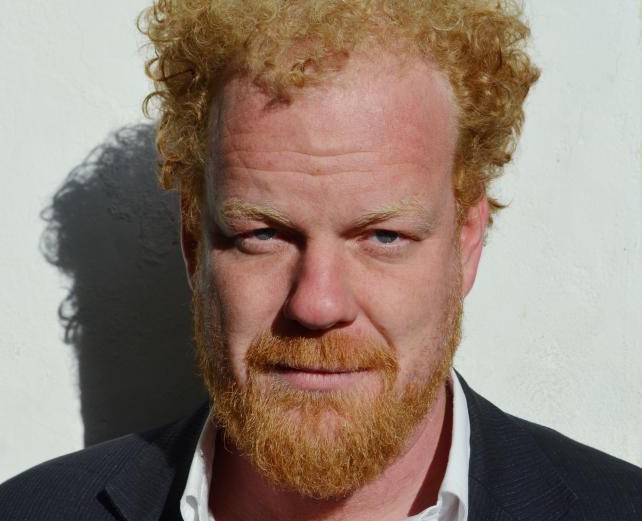Prague College addresses the future challenges of Europe
By Alex Went on 30 July 2018 13:07
Last updated on 05 May 2021 14:05
The 16th annual European Summer School for university students took place at Prague College during the month of July. This year's programme focused on current issues faced by the European Union, with a special focus on possible future scenarios.
'Europe in Transition: Exploring EU’s Futures' asked important current questions: what will the EU look like in the upcoming decade? Should it become the United States of Europe, or is a multi-speed Europe a better scenario? How will the departure of Great Britain shape the future of the Union? Will there be an EU Army? And is the EU prepared to tackle any emerging challenges?

The academic programme included lectures built around topics including defence and security policy, geopolitical challenges, globalization, populism and euroscepticism. Among the speakers were two Prague College lecturers, Head of the School of Business Dr. Stefano Cavagnetto and Lucie Rivera, Module Leader of Global Business Environment and Business Strategy.
Lucie Rivera's talk on the concept of solidarity in the EU (with reference to the various scenarios envisaged for its future by President of the European Commission Jean-Claude Juncker) was divided into three interrelated parts. The first dealt with the socio-economic implications of solidarity and its main articulations in the current EU policy framework. The second part explored the main political traditions and streams that contributed to shaping the current views of solidarity in the EU. Finally, students were introduced to Juncker's scenarios: 'Carrying On', 'Nothing But The Single Market', 'Those Who Want More Do More', 'Doing Less More Efficiently', and 'Doing Much More Together'. These proposals were explored in terms of political traditions, and also their relationship with the concept of solidarity in the European Union.

Dr. Stefano Cavagnetto's talk on 'The Future of Europe: reflections and scenarios for the EU27' explored the scenarios of Jean-Claude Juncker, taking into consideration ethical normative frameworks. In particular, the five different scenarios were analytically considered following the classic matrix of Richard Dworkin, based on the dimensions of policy and principle on one side and individual and collective on the other side, and presented in terms of the consequences for the concept of solidarity in Europe. From one perspective, the talk was aimed at clarifying the genesis of the concept of solidarity by taking a philosophical point of view on its socio-historical and political legacy. From another, it provided a set of philosophical tools to investigate the issue of solidarity across member states.

The sessions concluded with an activity in which students worked in teams to develop their ideas for Europe in transition, and carry out activities for designing the new European Union according to Juncker’s suggestions. In particular, students addressed new possible scenarios and implications for the concept of solidarity and its further implementation across the EU27 (the current states minus the UK).
- School of Art, Design & Media (433)
- Student Life (331)
- School of Business, Management & Technology (268)
- Global Engagement (141)
- Research & Creative Practice (95)
- Seminars & Workshops (73)
- Master Speakers Series (70)
- Exhibitions (69)
- New Students (64)
- Academic Partners (58)
- Alumni (58)
- Living Futures (52)
- Graduation (47)
- Visiting Artist Lecture Series (44)
- Conferences (37)
- Digital Campus (22)
- Professional Partners (14)
- Study Exchanges (14)
- University News (11)
- Industry Network (9)
- School of Education (9)
- Media Innovation Technology Series (8)
- Press Release (8)
- Erasmus+ (3)
- Student Societies (1)
- May 2025 (2)
- April 2025 (4)
- February 2025 (4)
- January 2025 (5)
- December 2024 (2)
- November 2024 (1)
- October 2024 (2)
- September 2024 (6)
- August 2024 (4)
- July 2024 (4)
- May 2024 (1)
- April 2024 (1)
- March 2024 (2)
- February 2024 (1)
- January 2024 (3)
- December 2023 (1)
- November 2023 (3)
- October 2023 (1)
- September 2023 (1)
- August 2023 (1)
- July 2023 (2)
- June 2023 (1)
- April 2023 (2)
- March 2023 (2)
- February 2023 (3)
- January 2023 (2)
- December 2022 (5)
- November 2022 (3)
- September 2022 (4)
- August 2022 (2)
- July 2022 (2)
- June 2022 (1)
- May 2022 (7)
- April 2022 (5)
- March 2022 (5)
- February 2022 (3)
- January 2022 (1)
- December 2021 (7)
- November 2021 (8)
- October 2021 (6)
- September 2021 (5)
- August 2021 (8)
- July 2021 (3)
- June 2021 (3)
- May 2021 (2)
- April 2021 (5)
- March 2021 (3)
- February 2021 (4)
- January 2021 (2)
- December 2020 (5)
- November 2020 (8)
- October 2020 (2)
- September 2020 (3)
- August 2020 (1)
- July 2020 (3)
- June 2020 (4)
- May 2020 (7)
- April 2020 (6)
- March 2020 (5)
- February 2020 (2)
- January 2020 (7)
- December 2019 (5)
- November 2019 (12)
- October 2019 (9)
- September 2019 (6)
- July 2019 (1)
- June 2019 (1)
- May 2019 (14)
- April 2019 (10)
- March 2019 (7)
- February 2019 (16)
- January 2019 (8)
- December 2018 (2)
- November 2018 (6)
- October 2018 (10)
- September 2018 (3)
- August 2018 (2)
- July 2018 (3)
- June 2018 (10)
- May 2018 (12)
- April 2018 (9)
- March 2018 (5)
- February 2018 (3)
- January 2018 (8)
- December 2017 (4)
- November 2017 (9)
- October 2017 (7)
- September 2017 (3)
- July 2017 (4)
- June 2017 (3)
- May 2017 (8)
- April 2017 (8)
- March 2017 (13)
- February 2017 (11)
- January 2017 (6)
- December 2016 (3)
- November 2016 (18)
- October 2016 (9)
- September 2016 (8)
- August 2016 (4)
- July 2016 (9)
- June 2016 (3)
- May 2016 (6)
- April 2016 (5)
- March 2016 (78)
- February 2016 (4)
- January 2016 (4)
- December 2015 (6)
- November 2015 (9)
- October 2015 (5)
- September 2015 (6)
- August 2015 (1)
- July 2015 (4)
- June 2015 (1)
- May 2015 (3)
- April 2015 (11)
- March 2015 (6)
- February 2015 (6)
- January 2015 (6)
- December 2014 (1)
- November 2014 (17)
- October 2014 (4)
- September 2014 (8)
- August 2014 (5)
- July 2014 (1)
- June 2014 (10)
- May 2014 (25)
- April 2014 (32)
- March 2014 (53)
- February 2014 (25)
- January 2014 (10)
- December 2013 (10)
- October 2013 (1)
- September 2013 (1)
- July 2013 (4)
- June 2013 (2)
- March 2013 (2)
- February 2013 (74)
- January 2013 (6)
- December 2012 (13)
- November 2012 (3)
- October 2012 (5)
- September 2012 (156)
- July 2012 (1)
- November 2011 (1)
- November 2010 (1)
- November 2009 (1)
- November 2008 (4)
- September 2008 (1)
- July 2008 (1)
- June 2008 (4)
- May 2008 (2)
- April 2008 (3)
- March 2008 (2)
- February 2008 (1)
- December 2007 (1)
- October 2007 (1)
- August 2007 (1)
- July 2007 (1)
- June 2007 (4)
- May 2007 (1)
- April 2007 (2)
- March 2007 (3)
- January 2007 (1)
- November 2006 (1)
- December 2005 (1)
- November 2005 (1)
- October 2005 (1)
- August 2005 (1)
- May 2005 (1)
You May Also Like
These Related Articles

European Summer School at Prague College 2018

